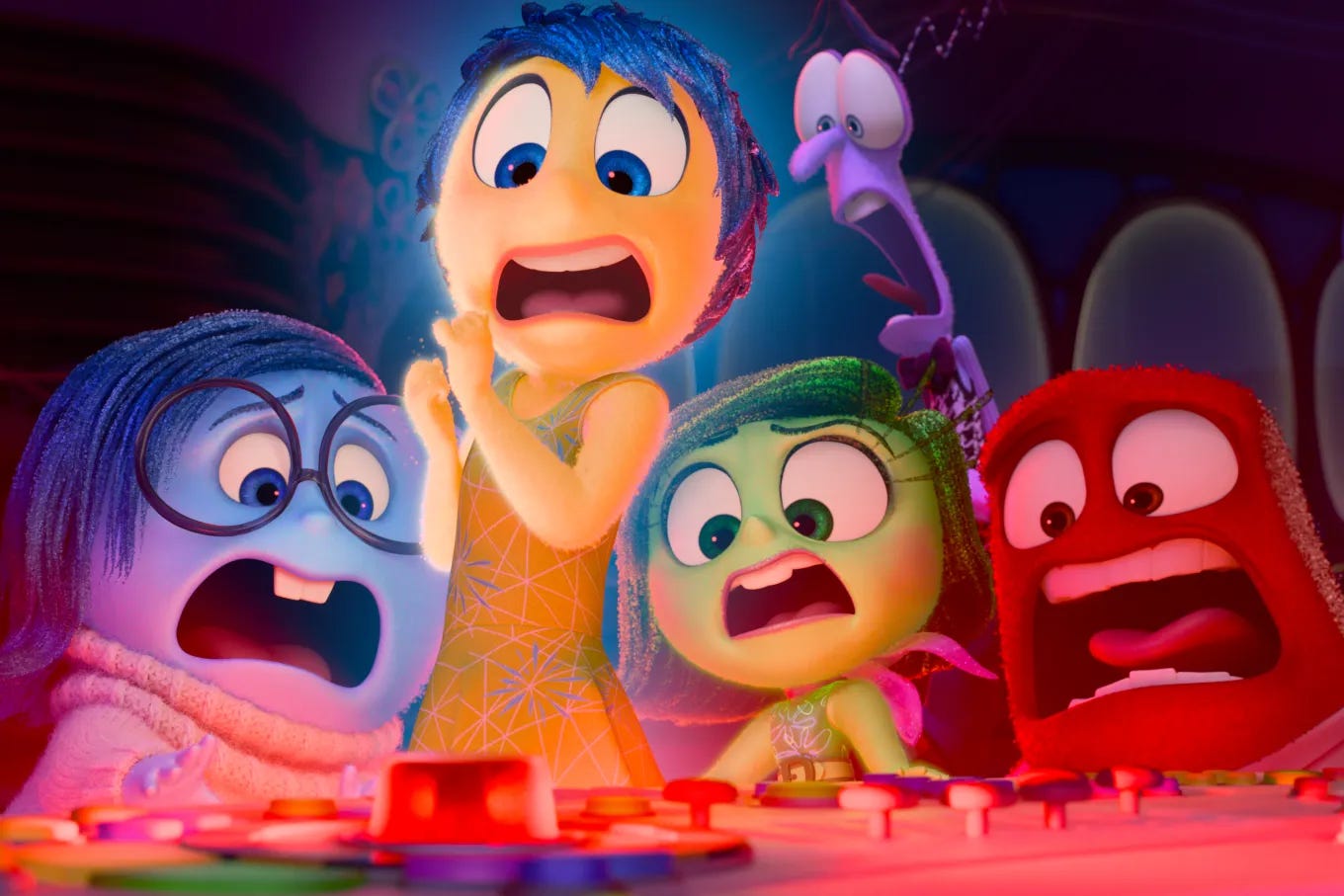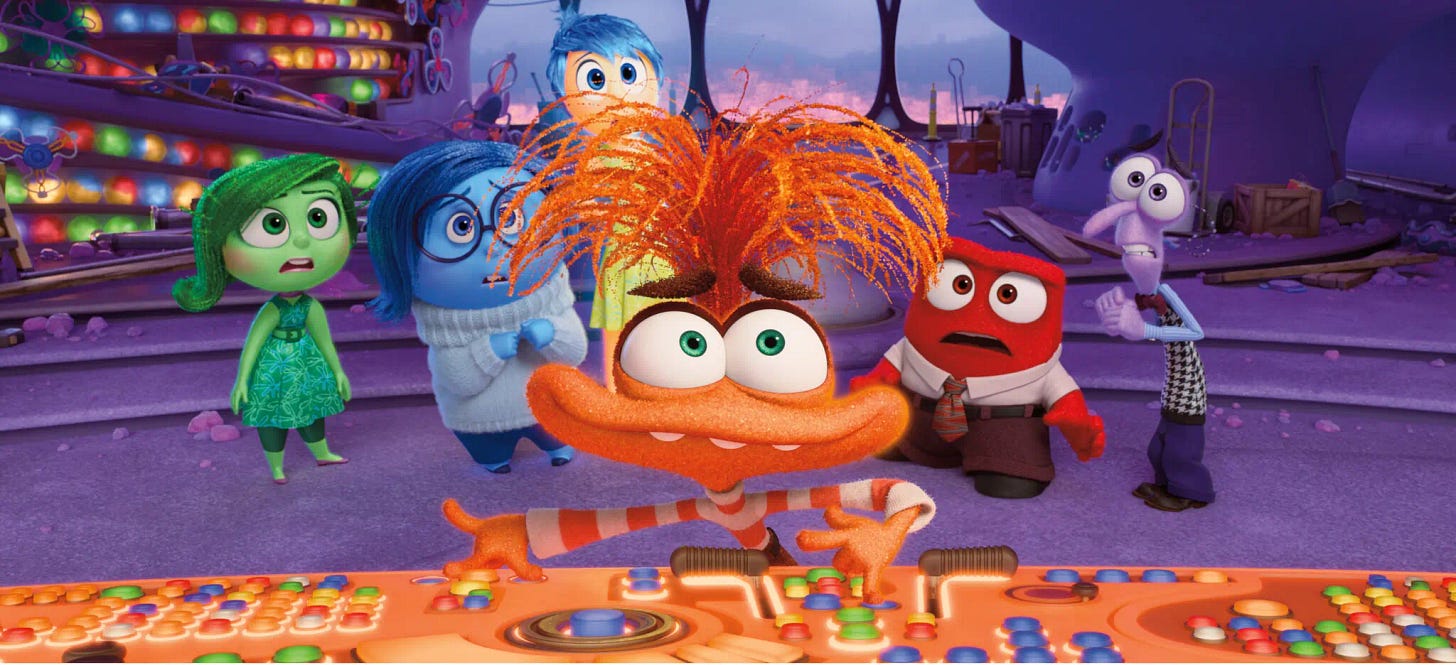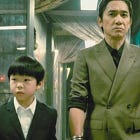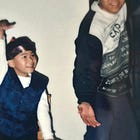Anxiety Needs A Friend: Inside Out 2 Reflections
How commitment to messy, real-life friendship can help the 'Anxious Generation' rebuild loyalty, connectedness and resilience.
Disney Pixar’s Inside Out 2 is a coming of age story, narrated from the colourful and creative control room of Riley’s inner-world. Her emotions of greatest influence (Joy, Sadness, Anger, Disgust and Fear) are personified as endearing main characters who bring to life abstract psychological concepts which evolve as Riley grows, and especially so after the “puberty alarm” sounds.
Puberty is awkward, scary and messy. It sneaks up on Riley overnight like a raging wrecking ball—a “demo day” where her emotional headquarters are turned upside down with an extended control pad filled with buttons that are now extra sensitive to “overreactions”. Riley wakes up the next morning with a zit on her chin, smelly armpits, and a mother shocked by her daughter’s moody rage.
The sequel is focused on Riley’s maturing. She’s now a thirteen year old on the way to hockey camp try out before her first year of high school. Travelling with her two best friends, she discovers in the car ride that they shared a secret: Bree and Grace had been assigned to the same high school without Riley. This triggers Riley’s insecurity with being left out, and becomes the catalyst by which new teenage-centric emotions are introduced: Envy, Ennui, Embarrassment, Nostalgia and the new leader, Anxiety.
The ‘Anxious Generation’ & Loneliness
The introduction of ‘Anxiety’ as the new leader upon puberty is apt. Our youth may be more emotionally fluent than previous generations, but they aren’t happier. Despite greater emotional awareness and mental health advocacy, our nation’s youth (especially among teenage girls) are mentally unwell in record numbers.
Social Psychologist, Jon Haidt (
) has coined our youth the ‘Anxious Generation’, ascribing phone-based childhoods, overuse of social media, and a lack of real-life community connection as a reason for rapid mental health decline. Our youth are not only anxious, they are also desperately lonely. In 2023, the World Health Organisation (WHO) declared loneliness ‘a global public health concern’. Gen Z writer and commentator, , attributes her generation’s loneliness to social media’s impact on real-life friendship.In her essay, “Aren’t You Lonely?” she shares how social media apps such as Facebook, Instagram, Snapchat and TikTok turned teenage friendships into “another joyless thing to do on a screen”:
Here’s what happened: when phone-based social media platforms emerged in the early 2010s they did not just take time away from real-life friendships. They redefined friendship for an entire generation…They removed the requirements of effort, of loyalty, even of meeting up, and replaced them with following each other back, exchanging a #likeforlike, and posing for selfies together…They took teenage friendship—which used to be full of friction, thrills and adventure—and made it another joyless thing to do on a screen. Another thing to be performed and marketed and publicly measured.
While the Inside Out franchise has helped many to better appreciate their inner-world and to increase emotional fluency, I don’t believe this is its only focus. Riley’s story also shows us the positive and grounding influence of what’s outside of us in the real-world: a healthy family life, shared experiences with friends, physical exercise, and enjoying art and music.
The Value of Real-Life Friendship in an Anxious World
In the first movie, we learn that Riley’s five most-important core memories are represented by ‘islands’ (Family, Friendship, Goofball, Hockey, Honesty) —the values shaping her personality, beliefs and Sense of Self.
As a child, ‘Family’ is the largest and most influential island, with her close ties to her parents being the main source of her joy. As a teenager, ‘Friendship’ becomes the largest island, showing the normal transition of growing peer influence over a teenager. Both movies highlight that our relational bonds play an important part in shaping our identity and resilience into adulthood.
In a world that over-values online connections and digital presence, Inside Out 2 shows us the value of navigating friendships in the real-world. As a Gen Y woman, I didn’t get a smart phone until my early 20’s. I can compare my current connections with what it was like before mass texting and social media. I think the biggest difference is that compared to online connections, in-person experiences can be vulnerable and messy…and especially so for teenagers. Puberty comes with zits, braces, feeling left out, awkward silences, and teenage drama—mess that can’t simply be filtered away with a single swipe—and that’s a good thing.
Riley, Bree and Grace may not be the coolest kids on the block, but they show us the value of a friendship marked by kindness, vulnerability and dorky teen play. When ‘Joy’ was still leading Riley’s emotional headquarters, her decisions were guided by the self-belief “I am a good friend”. This meant valuing kindness over coolness, and goodness over popularity.
When Grace clumsily embarrasses herself in front of her classmates, Riley refuses to laugh with others and steps in to help with an empathetic word. She is then joined by Bree. From that moment on, trust is built and the three girls are inseparable and flourish as best friends—perhaps from the shared confidence that they truly have each other’s back and are not just using each other as popularity props “for the Gram”.
Over the years, I have learned that being liked behind a screen or loved after a “glow up” can lead to insecurity. My most confident friendships are found in the people who have seen me through my cringeworthy teenage and early-adult years. My inner-circle might be small, but these are the people who truly know me and accept me—warts, zits, failures, mistakes and all. With them, I can enjoy a whole deeper level of love and loyalty because our friendship has been tested, and we’ve committed to working through decades of mess together.
Friendship Is Messy Because the Human Heart Is Messy
The strength of Riley’s friendships is tested when Anxiety convinces her that she will be a loner in high-school unless she changes her personality to fit in with older players. Under Anxiety’s leadership, Joy and the original emotions are “bottled up” and thrown into a vault. Riley’s self-belief “I am a good friend” is replaced with new beliefs - “If I’m good at hockey, I’ll have friends”, “If I make the high school team, I won’t be lonely.”
These new beliefs drive new decisions. Riley’s once selfless nature suddenly becomes self-preserving. To befriend popular hockey player Val Ortiz, Riley distances herself from Bree and Grace, and reinvents herself with a pretend persona to fit in. From the outside, it may seem like Riley became “bad” overnight, but I love that Inside Out 2 shows us the realities of human nature—that our hearts are capable of both good and bad.
Before Riley stepped in to help Grace in the classroom, ‘Disgust’ had tried to stop her from sinking her social life through association with “the social Titanic”—an inner thought which shows Riley’s capacity for being judgemental and unkind. When it comes to the human heart, no one can claim perfection. All of us have an inner-world that’s bent towards self-interest and self-preservation—whether we act on our desires is a different story.
All of us have an inner-world that’s bent towards self-interest and self-preservation—whether we act on our desires is a different story.
Messy Friendship Builds Trust, Love and Loyalty
Despite Riley’s anxious desire for success and friendship, after a series of bad decisions, she ends up on the hockey field’s Penalty Box—ashamed and alone. As her Sense of Self crumbles with the new belief “I’m not good enough”, she spirals into a panic attack. This is illustrated by Anxiety losing control of headquarters in a destructive whirlwind; completely paralysed except for a single tear moving down her cheek. The intensity of this scene was painfully palpable, and helped us to sympathise with the fear and sadness behind Riley’s rage.
When Bree and Grace see Riley panicking in the Penalty Box, they quickly move towards her with concern and compassion. Although it would have been the deserving response, there was no cancellation or condemnation. Instead, Bree and Grace extends a countercultural love that’s unwavering and unchanging; unconditional and undeserved. Proverbs 17:17 emphasises the value of such love: “A friend loves at all times, and a brother is born for a time of adversity.” In a sin-stained world where everyone is capable of hurting their loved ones, we need friends who will stick close even in our most unloveable moments. We need to be this friend for others as well.
With the support of her friends, Riley’s anxiety calms, and she’s able to apologise and reconcile with them. Inside Out 2 shows us that friendships can be messy because the human heart is messy, but by braving the mess together, friendships can deepen with love, loyalty and resilience.
“A friend loves at all times, and a brother is born for a time of adversity.” - Proverbs 17:17
In order to truly engage in ‘messy’ friendship, we need to learn to value friendship over popularity. I believe social media has caused us to confuse the two. It’s why influencers can have millions of followers, and still feel utterly alone. Popularity is measured by likes, adoration, and influence—things that need to be sustained by performance and pretence. Friendship is measured by trust, commitment and loyalty—things fostered by mutual honesty and vulnerability.
Popularity will wax and wane according to your relevance and likeability, but true friendship is anchored in the confidence of being fully known AND fully loved. Proverbs 18:34 highlights such difference: “A man of many companions may come to ruin, but there is a friend who sticks closer than a brother.” This begs the question: do your friends know you, really?
Popularity will wax and wane according to your relevance and likeability, but true friendship is anchored in the confidence of being fully known AND fully loved.
In our hyper-digital world, true friendship is on the decline, and unless something changes, the ‘Anxious Generation’ will continue to grow and spill into Generation Alpha. Loneliness is not only a Gen Z issue. People my age often complain about the difficulty of making new friends as one gets older. There’s always an external excuse: no time, people are difficult, times have changed…but are we humble enough to look within? Are we willing to admit that perhaps our idols of comfort, control, efficiency and self-interest has made us prefer isolation and virtual interactions—it’s less messy this way—but at what cost?
Messy Friendship Builds Resilience and Personal Growth
The truth is, mess doesn’t just reside outside of us—it’s within us. Proximity and intimacy will inevitably draw out the ugliest parts of us, and force us to admit that there’s bad within. Riley is incredibly hard on herself—a perfectionism that’s formed from Joy’s suppression of all her negative experiences and memories. Her original Sense of Self was built by only positive and self-empowering qualities: “I am a good person”, “I am a winner”, “I’m kind”, “I’m brave”.
After her conflict, she comes to accept a new Sense of Self with traits that are positive and negative; self-empowering and interdependent. She’s brave but also gets scared. She needs to fit in but also wants to be herself. She’s kind but also selfish. She’s a good person but also makes mistakes. She needs help sometimes. Proximity and intimacy brought the inside-out but as iron sharpens iron, Riley matures as a young woman and friend. True friends will help us grow.
The Perfect Friend (And the Friend We Need to Be)
Inside Out 2 may be a simple story about three teenagers navigating a small issue, but it brilliantly addresses some of the larger issues facing our youth and world today. In a broken world, it’s completely normal to want to plan and control your future in order to silence your fears. But perhaps our capacity for anxiety is evidence that we are dependent creatures. Perhaps it’s why overthinking and over-feeling in isolation, only makes Anxiety grow stronger and louder.
Perhaps our capacity for anxiety is evidence that we are dependent creatures. Perhaps it’s why overthinking and over-feeling in isolation, only makes Anxiety grow stronger and louder.
Over the years, I have learned that unlike my Creator, I am not self-sufficient, self-made, or self-sustaining…and that’s ok! Instead, when fear and anxiety takes over, my heart needs a joy, wisdom, and sense of self that comes from outside of myself. When I’m struggling, I need people who will help me see old problems with new perspectives. I need friends to laugh with. I need mentors who will speak truth in love. I need cheerleaders who will empower resilience and perseverance. I need a church family to spur me on in faith, love and hope. I need an inner circle who knows my limits, weaknesses and flaws—and commits to sticking by to see me grow.
But most of all, I need Jesus—the perfect Friend—who left the comforts of heaven to draw close and show up for me in-person. I need a Love to pursue me, even when I don’t feel worthy of connection. I need a Saviour who can empathise with humanity’s scars, but refuses to enable wounded selfishness or victim mentality. I need a Confidant who knows the depths of my heart, yet loves me the same. On days when anxiety tells me that I’ll never be good enough, I need an external and unchanging Truth to define who I am: “there is now no condemnation for those who are in Christ Jesus” (Romans 8:1). I am in Christ alone.
Jesus is the faithful friend who loves at all times, forgives our mess, and sticks closer than a brother—and he calls the church and the Anxious Generation to step out and do the same.
How did Inside Out 2 impact you? I would love to hear your thoughts, so share them in the comments or reply to this email.
Enjoy movie reflections? Here’s a few more from my archives!
My heartfelt gratitude to and for their gift of a Paid Subscription since my last letter, “Its OK to Fail”.
I intend to keep the majority of my content free to read, however as a Writer Mum, any financial gift helps me immensely.
If you enjoyed this read and want to enable my words to reach more people, you can:
1) Click the heart button below.
2) Subscribe for free.
3) Upgrade to a paid subscription ($5AUD/month or $50AUD/year).
4) Share my publication with friends who would benefit.











I love reading your emails Heidi. It’s always a rich rewarding read. Thank you for sharing yourself.
Wow this such a thorough and insightful take on a powerful movie! I throughly enjoyed reading your thoughts on it :)
What I loved most about this movie is how it opens up kids’ eyes to the full spectrum of human emotions and shows them that feelings are neither good nor bad - they are a part of the human experience and every emotion plays an important role in our lives. It helps them see that their feelings don’t define them and they are a good kid underneath it all.
I watched it with my 6 year old who’d never heard of “anxiety”! But like me he’s a perfectionist so he’s definitely felt it. Now when those feelings inevitably come up for him, he’ll have a word for it. He won’t feel so alone. Maybe he’ll even picture an orange face, googly eyes and crazy hair!